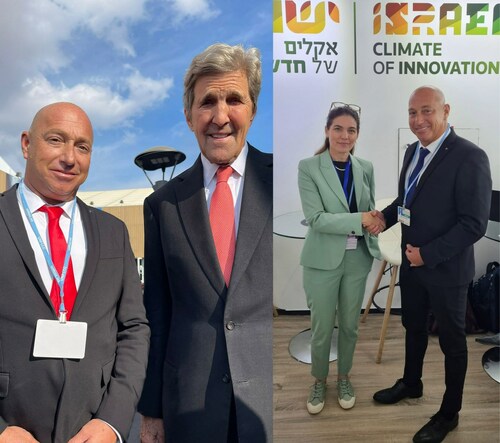EILAT, Israel, Jan. 12, 2023 /PRNewswire/ — Trucknet Enterprise (TASE: TRAN), is spearheading solutions for reducing fuel consumption and greenhouse gas emissions, as well as limiting empty rides in heavy vehicle fleets.

Hanan Fridman at the climate committee in Sharm, with John Kerry and former Minister of Environmental Protection Tamar Zandberg
Trucknet received the results of the pilot project that it conducted with the Israeli army (IDF). According to the results, the Trucknet Smart Catalyst fuel converter, successfully demonstrated a 7% savings on fuel consumption under laboratory conditions. This translates as a 15% reduction in overall polluting emissions from engines. The IDF already announced that, in light of these results, it intends to conduct a follow-up pilot study under field conditions. The U.S. army also plans to conduct a similar pilot, after having evaluated the company’s advanced technology for reducing empty truck rides.
The heavy transportation sector is responsible for approximately 20% of all the polluting emissions in the world. Trucknet’s unique smart fuel catalyst is an important milestone and, together with the company’s other smart solutions, it is part of a basket of services that benefits transportation and logistics companies, and can be adapted to existing systems – making the transportation process more efficient and maximizing profits through real time, fully digitalized tracking.
The Israeli Ministry of Environmental Protection recently joined the global trend of reducing polluting emissions in land transportation, and commissioned a first pilot project of its kind in Israel to reduce truck traffic on the roads. The study, which has a budget of NIS 1.25 million for the first year, will be managed by Trucknet Enterprises in partnership with the Israel Innovation Authority and the Israel Transporters Association. For the first time in Israel, empty trucks will be matched with containers that require transportation. The goal: a 35% reduction in unnecessary trips by empty trucks. In the pilots that the company conducted in Europe, it saved 17% of transportation costs.
A basic understanding of how the logistics and transportation industry works and the planned future battle to reduce greenhouse gas emissions points to the acute necessity for a sharing platform such as Trucknet’s, that doesn’t only reduce empty truck rides and greenhouse gas (GHG) emissions and saves money, but also can be used as a tool for future trading in greenhouse gas emissions for logistics and transportation companies.
At the recent Climate Conference in Egypt, Mr. Hanan Fridman, Trucknet CEO, spoke with President Biden’s special envoy on climate change, John Kerry, about the agreement that the company signed for a pilot project with the U.S. army. “Both sides understand that joining forces within the organization will generate economic efficiency and a huge savings in fuel and transportation costs”‘ said Fridman.
Aside from optimizing trips, Trucknet developed an online calculator that calculates emissions during a trip. The next global step,” Fridman explains, “will be about trading greenhouse gas emissions. The concept of ‘carbon credits’ will be a growing field. Polluting companies, including truck fleets, will have to report their greenhouse gas emissions and pay accordingly. In their digital consignment notes (e-CMR) – which is already part of the platform – there will be a section that calculates the amount of emissions during the trip and the accrued reduction.”
Moreover, Trucknet is equipped with a professional navigation technology that creates the best driving route for the truck according to its height and weight, as well as determining a route that reduces greenhouse gas emissions.”
Trucknet’s technology is one of the milestones on the path towards significant reduction until reaching the goal of fully electric truck fleets.
Trucknet was founded in 2016 and in 2020 the company was made public on the Tel Aviv Stock Exchange.
Photo – https://mma.prnewswire.com/media/1981684/H_Fridman_J_Kerry_T_Zandberg.jpg

SOURCE Trucknet Enterprise